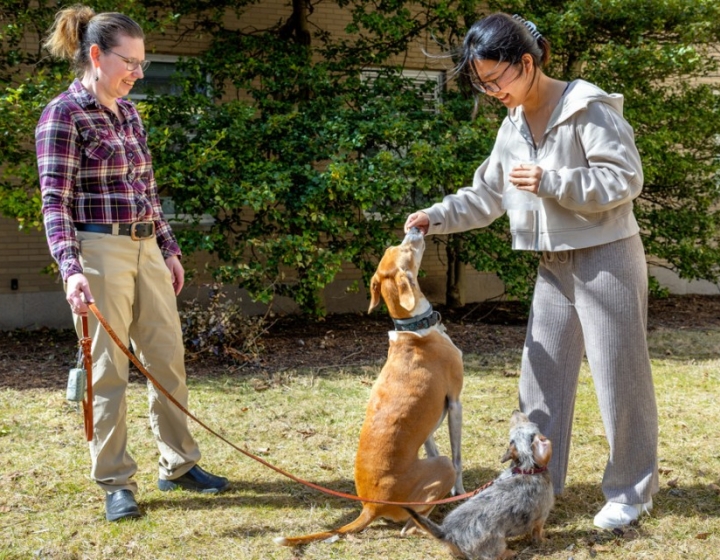“Some Pig”
Very few teaching hospitals are dedicated with a quote from Charlotte’s Web, but the Nemo Farm Animal Hospital at Cornell is named for a very special former patient. As Austin O. Hooey Dean of Veterinary Medicine Michael Kotlikoff put it at the June 23 dedication ceremony, Nemo was “some pig.”
George Goldner and Nancy Krieg brought Nemo to Cornell’s large animal hospital in 2013 for treatment of lymphoma, an aggressive blood cancer. Although small animals such as dogs and cats are commonly treated for lymphoma, large animals are not. A Cornell medical team devised a means of delivering chemotherapy to their patient, who weighed more than 700 pounds. Nemo’s cancer went into remission for more than a year, which he spent at the hospital enjoying the company of staff and other patients.
Goldner and Krieg expressed their gratitude with a gift that will expand the hospital’s capacity for studying and treating cancer. Kotlikoff thanked them during the dedication ceremony.
“Your gift will enable us to provide the kind of care, education, and research into better treatments that Nemo experinced here,” he said. The dean also admitted to being a member of the pig’s unofficial fan club: “Nemo captured the hearts of faculty, staff, and students in the hospital. I cherished my visits with him.”
Goldner praised hospital personnel for the high quality of their care for Nemo. “Extending his life, helping make [it] better, generally without pain or discomfort; this was done through great intelligence, knowledge and compassion,” he said. “There can be no higher achievement than of relieving the suffering and extending the lives of those who cannot speak for themselves, and you do that every day here through your work with animals, your research, and your training of young people.”
In her remarks, Cornell veterinary oncologist Dr. Cheryl Balkman admitted that the notion of treating a large pig “was rather daunting. There was nothing in the literature. We contacted other vet schools, looked at the listserv on oncology, but there was nothing out there. It really was a first for everyone involved.” Balkman added. “It has opened the door for other large animals to be treated for cancer.”
Dr. Emily Barrell was in her first year of residency at the large animal hospital, and on duty, when Nemo arrived. She took charge of his day-to-day care for 14 months. “I learned a great deal about medicine and oncology and what it means to be part of a collaborative team.” Barrell said Goldner’s and Krieg’s advocacy for animals reminded her why she enjoys being a veterinarian.
“You refused to accept the finality of Nemo’s diagnosis,” she told them. “Thank you for pushing us to try something new despite all the odds stacked against us. Because of your unfailing commmitment to Nemo we have advanced what we know in our fields. Thank you for making us better vets.”





